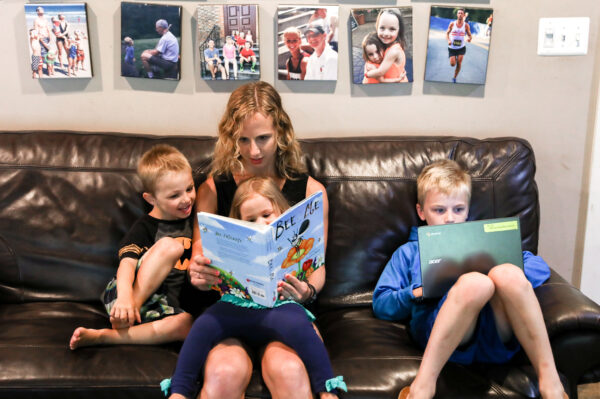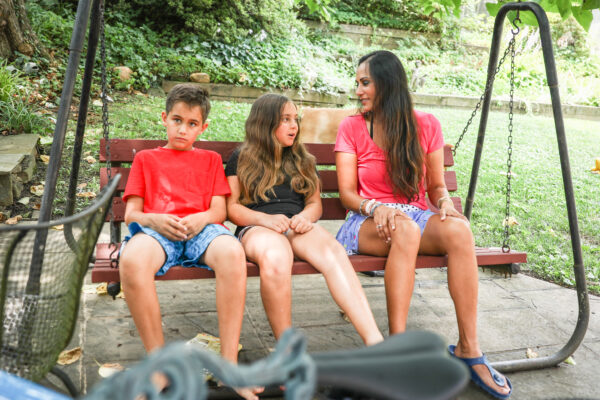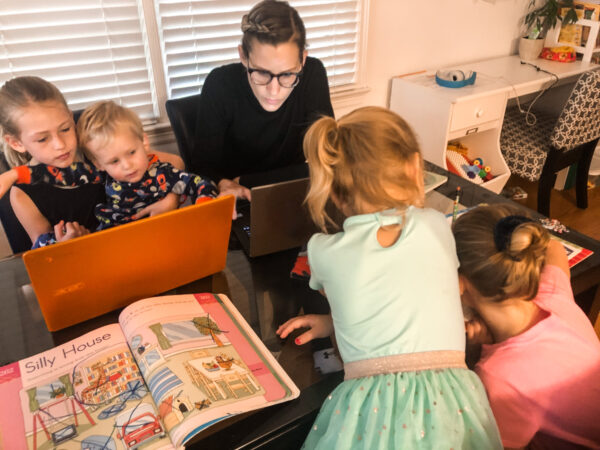BY
Rachel Greszler and her husband have managed a chaotic household with six children since mid-March when they ended up with everyone at home full-time, while still trying to juggle their jobs.
The Greszler’s live in Bethesda, Maryland, and four of their children, aged 11, 10, 8, and 6, attend Montgomery County public schools, while their 5-year-old was in pre-K. A nanny looked after their youngest, 2, until the lockdown started.
“It was very hectic at first and everybody was struggling—the schools and the parents and the kids,” Greszler told The Epoch Times.
She said the first week was spent running around getting devices for children, figuring out which child had a class when, and trying to get online platforms to work. The school ended up providing Chromebooks to the four oldest children so they could join their respective online classes.
They each joined an online class anywhere from half-an-hour to an hour in the morning, at different times.
“We weren’t really monitoring what was happening while they were sitting there in their online portion of their class and didn’t really have a ton of time on the side to be making sure that they were doing what they should be doing,” Greszler said. “But at least for these months—March through June—they really weren’t doing a whole lot of new material. And they didn’t have much homework.”
Grezler works at a DC-based think tank, while her husband is a lawyer. They both had to transition to a work-from-home model, juggling online depositions and conference calls amongst the children’s needs.
Grezler estimates all her children have suffered a learning loss. And although she’s concerned about the loss already sustained, it’s the next semester that worries her more. Her ideal scenario is that the five older children would be at school, in class, five days a week. But, that’s looking unlikely.
Montgomery County Public Schools hasn’t released its final plan for the fall, but has indicated that the semester will start with all students online, with the hope to have all students (who opt in) in class once or twice per week by Thanksgiving.
“My concern is … inevitably our children aren’t going to be on the same schedule. And so it’s going to be trying to manage five different schedules, and who’s going to school on which day, and when do you have to be online?” Greszler said.

The Greszler family, including six children, have juggled work and school since March at home in Bethesda, Md., on July 11, 2020. (Charlotte Cuthbertson/The Epoch Times)
“My personal opinion is that, if you look at the science behind this, children are less affected by COVID-19 than even the seasonal flu, and they don’t really seem to pass it on very much to older adults. And so I understand the concern of teachers who would be there, but I do think there are ways to safely mitigate the risks.”
Recent studies published by Iceland, Sweden, and Germany found that opening schools didn’t cause any deaths or an increased risk of infection in children; neither were the children likely to spread the disease. The Swedish study also noted no increase in infection among teachers compared to other professions.
Centers for Disease Control and Prevention Director Robert Redfield has said the agency never recommended schools close in the first place and advocates for reopening in the fall.
“Having the schools actually closed is a greater public health threat to the children than having the schools reopen,” Redfield told The Hill on July 9.
“I don’t think we should go overboard in trying to develop a system that doesn’t recognize the reality that this virus really is relatively benign to those of us that are under the age of 20.”
Aside from school, Greszler and her husband are having to consider their jobs and whether one or both would need to reduce their hours or quit working altogether.
“Because it’s a big task to provide a holistic education for a child and, in our situation, five children,” she said. “Whether or not they still participate in the public school and attend those classes, we’re going to have to be engaged in some level of homeschooling.”
Right now, work is squeezed into any spare space and time around the kids’ needs. Greszler grabs time to work in the attic when she can, and her husband heads to the basement. She’s getting up at 4 a.m. some mornings and staying up late to get everything done.
Opting for Online
Paru Rellan said her 11-year-old son and 9-year-old daughter will be opting for the online-only version of Montgomery County public schooling for the year. They’re entering the 4th and 6th grades, respectively.
Rellan said she’s opting for distance learning because she’s concerned about any potential long-term effects that COVID-19 may inflict if her kids get it.
The family has been home together since March 13, initially for a two-week period that has grown to four months and counting.
“In the first two weeks, the most difficult part was that there was no online school, they were just off,” Rellan said. She said the whole first month was a rough transition.
“There was a lot of crying, anger, confusion, and a lack of emotional stability,” she said. “The children went from going to school for six to seven hours a day to nothing … it was a free fall.”
She said, although she was able to work from home, her husband had to continue going into the office most days.
“It was a very challenging environment. My work life went from eight straight hours of work to two hours here and several there. There was a point where I was sitting in my car with the door closed so that I could take a conference call in quiet,” Rellan said. She said she’s extremely grateful to her government employers for allowing her job flexibility.

Paru Rellan (R) and her children Sahil (L) and Roshni Babra talk about the challenges of distance learning while staying at Paru’s parents-in-law’s house in Tenleytown, D.C., on July 11, 2020. (Charlotte Cuthbertson/The Epoch Times)
The online schooling that Montgomery County rolled out was “deplorable,” Rellan said. She said the children had direct lessons online for only an hour a day, sometimes two hours. Participation in the Zoom classes for social studies and art were optional.
“I mean, people pay tens of thousands of dollars in property tax and sales tax and state tax to go to this amazing school district,” Rellan said.
“Even if they had spent an hour a day going over the states and the state capitals for social studies, or any number of things that would have constituted third grade social studies, I would’ve been happy.”
She said she would have liked to have seen teachers periodically check in one-on-one with each child, and for the guidance counselor to have check-in hours.
Rellan supplemented the online classes by researching what curriculum her kids were learning and bought relevant workbooks to help keep them engaged. They both have one-on-one tennis lessons twice a week, they do a coding class, and they love word searches and board games. She realized having their study desks in their rooms was adding to the isolation and now insists they do their work in the living room or dining room.
“Because they could go up [to their bedrooms] and after their class they’ll be on Netflix or YouTube. And it’s like going to a casino, you lose sense of time,” she said.
Both children just started an all-online summer school for two weeks, which consists of 2 to 3 hours every other day.
Overall, Rellan thinks the kids’ academic levels have “regressed tremendously” and they’re more distant as people.
“I know it sounds all bad, but, I think what they’re being challenged with right now will also give them a certain level of resilience,” she said. “But that’s also coming from someone who lives in a relatively stable home environment. I cannot speak to the children that do not, where leaving home was a solace for them.”
One bright spot throughout the pandemic has been Luna, the family’s bouncy golden retriever they’ve had since September.
“Having a pet is probably the only emotional support that they’ve received, outside of us—but parents are different, the dog is just their friend,” Rellan said. “The only animal or being that’s benefited from this pandemic is the dog.”
In about three weeks the family will move back to their home, which was burned down about 20 months ago. They were in a rental until May, but their house was delayed due to the pandemic, and they’ve been staying with Rellan’s in-laws ever since.
Nebraska, Here We Come?
Lisa Davis is mom to two elementary school children and a 22-month-old toddler—all girls. Her two oldest, aged 8 and 5, are heading into 3rd grade and kindergarten, respectively.
Davis and her husband are seriously considering a move to Nebraska for the year if their school in Virginia doesn’t open up for full, in-person lessons, five days a week. She won’t know for another week or so what the private, Lutheran school will do, but the public schools in Arlington County are only offering online classes.
Davis is hoping that, because the class sizes at her kids’ school are much smaller than at public schools, they can go back as normal while accommodating social distancing measures.
“But I have a feeling that there are so many people who are just concerned about being in the classroom, that I believe we’re probably going to end up at half days,” she said. Half days would be a dealbreaker for her and her husband, both for the children’s learning and for their jobs.
“It just seems like a very stressful situation. It doesn’t seem sustainable. And if they’re only in school for half days, they’re not learning what they need to learn,” Davis said. “And I don’t see how you’re going to get a kindergartener to wear a mask,” she said, referring to a possible mandate imposed by Virginia Gov. Ralph Northam.
Davis has already cut her work down from the equivalent of two days a week to one and she’s having to consider giving up her career completely.
“I feel like in the springtime I got my work done because I gave up on sleep. And so I am exhausted. I feel like I’ve just been run ragged. And I don’t see how we can keep doing that in the long term.”
She said at times her and her husband both had conference calls for work and the girls had limited supervision. “That’s not good. Our kids are a little too young to be on their own for very long, unattended. They continuously make some bad choices.”
So, the Davis’s are actively looking at Plan B in Nebraska with fully open schools. The family is currently in Lincoln, Nebraska, at Davis’s mother’s house. They visited three local schools last week, finding one they’d be happy to enroll their girls in for the year.
Davis said she agrees with the American Academy of Pediatrics, which released a statement on June 25, saying all policy considerations for the upcoming school year should start with a goal of having students physically present in school.
“Yes, it’s not about eliminating risk, it’s going to be about mitigating risk, but we also feel like it is detrimental to children for them not to be present in school,” Davis said.
Although Davis is confident her kids will catch up academically, she feels they need school for the social and emotional benefits just as much. Not long into the shutdown, her 8-year-old started having sleep problems and frequently woke the parents up in the middle of the night. The 5-year-old, who had been fully potty trained, started having issues again.
However, the baby has been the big winner. “She has all this attention, all these people to play with. And for her, it’s great,” Davis said.
She said her childrens’ school did a great job during the transition although the technology was a new challenge.
“At that point in time, we all thought it was just going to be for a short time. And it seemed like this is doable, we can do this. It’ll be kind of fun,” she said.
But, as time wore on, the challenges magnified, and the reality of a completely different education paradigm pushed the Davis’s to think outside the box to where Nebraska is now the likely option.
No Great Option
Adrienne Schweer lives in McLean, Virginia, with her husband and four young children, aged 8, 6, 4, and 1. Both parents work full time, usually more than 40 hours each a week, while three of the children attend public school or preschool and a nanny looks after the baby.
Their busy lives were held together with a hodgepodge of after school activities and neighborhood babysitters. That all came crashing down in March, and while both parents’ jobs got busier than ever, albeit from home, the kids became their immediate concern.
“I changed a lot of diapers while on conference calls, as did my husband. Just real life in between,” Schweer told The Epoch Times, from a closet—the best place for a quiet phone call. “I’m never able to do a work call or Zoom without a kid running in needing a sharpened pencil or wanting applesauce.”

Adrienne Schweer (C) tries to do her job and simultaneously help her four children with distance learning during the pandemic at home in Fairfax, Va. (Photo courtesy of Adrienne Schweer)
Their Fairfax County school district was “unsuccessful, to say the least,” in its ability to transition to online learning, Schweer said. It took three weeks before anything was rolled out, then it was another few weeks of technology failures where things were continuously delayed.
“So it took five to six weeks for the school to get into a system. The kids had a half hour to 45 minute Zoom with their teacher for live instruction, and then a bunch of add ons, online lessons, and virtual computer programs,” she said. It required a lot of oversight for her 8- and 6-year-olds to navigate several different computer programs—and reduce the time spent sending poop emojis to friends.
“And it got to the point where all of those many things, while good in nature, were just too complicated and too hard to put together,” Schweer said.
She ended up building her own homeschool program for the mornings before the Zoom classes, which the kids then joined mostly to see their teachers and friends. Schweer implemented “Grandma School” as well, where one of the kid’s grandmothers would connect online and read to a child, or vice versa.
“I think we did the best we could with the circumstances we had,” she said. “And there has been a lot of beauty to being home as a family. Having four young kids who can play together, they were creative and their relationships blossomed and they never were lonely.
“But they also have had a lot more screen time and TV time than they’ve ever had in their lives. I think across the board from all the parents I talked to, the big, huge fear is the amount of screen time that children are getting.”
Schweer’s ideal scenario of her children being back in school in person, full time, isn’t an option. The best the school is offering is two days a week in person. Parents had to decide by July 15 between a full year of virtual learning or a full year of the hybrid option.
“They need a reliable, compounding program that builds their skills, and I don’t have confidence that the two days a week or virtual learning will bring that,” she said.
Follow Charlotte on Twitter: @charlottecuthbo
Republished with Permission The Epoch Times SUBSCRIBE
Get Citizensjournal.us Headlines free SUBSCRIPTION. Keep us publishing – DONATE




